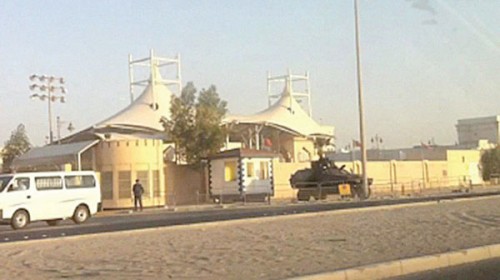From Dry Dock Prison… Appeal of Hunger to the ICRC

2017-11-22 - 3:13 am
Bahrain Mirror (Exclusive): Since January 2016, after the security authorities in Bahrain announced the escape of a number of prisoners from Dry Dock Prison, a new phase began inside this prison, a phase that has lasted for over a year and a half to later move on to Jaw Central Prison as well.
During these two years, representatives from the International Committee of the Red Cross (ICRC) visited Bahrain prisoners inside their cells, saw with their own eyes what was happening, and heard from the tongues of prisoners their sufferings.
The Bahraini authorities have signed with the ICRC a memorandum of understanding that allows the ICRC to search the country's prisons, but without revealing the results of those visits. The multiple calls for help by prisoners must have reached the organization, whose regional headquarters is based in Kuwait.
Now, the Committee has heard the new appeals of prisoners in Bahrain and their families who do not know who to complain to, especially after the failure of the Ombudsman General Secretariat and the Special Investigation Unit.
For one year and ten months, Bahrain detainees have not seen the sun. This is not a metaphor, but a real crime. Since the announcement made by the Ministry of the Interior in June 2016 about the escape of a number of detainees, the prison administration has turned the lives of inmates into darkness.
Deliberate medical negligence has also spread and led to the death of a number of inmates, most recently Abdul Rasoul Hassan Muhammad Ali Al-Shamlan (October 7, 2017). Diseases have settled inside prisons with the lack of adequate medicine, and the warmth of the sun in this hot country has become a distant dream that all detainees want realized.
Weapon of Starvation
These appeals seem familiar to the international organization, yet starvation has never been adopted by prison authorities. The meals provided to the prisoners are very poor in quality and are far from being described as nutritious meals.
Taking advantage of this, the prison administration allowed each family to submit a monthly sum of 30 dinars for their imprisoned family member to buy from the prison cafeteria. However, the administration raised the prices and set other restrictions for purchase.
Thirty dinars in the prison market is worth only 10 dinars with the price hike. The authorities do not allow the prisoner to freely buy what he wants, as they limit his purchase to a small amount. For instance, last Ramadan, a small bag of dates was allocated to each cell containing 15 prisoners, and the cell is only allowed to buy this bag of dates once a week.
Another example is that each prisoner is given one fruit, apple or orange, only once or twice a week, and the prisoner is not allowed to store the fruit, as it is confiscated during the frequent inspections.
Prisoners have also been deprived of their intellectual and spiritual needs, as books have been banned from entering prisoners for over a month, although the prison administration allows each prisoner to have one book.
The prisoners went on a general strike during September. The strike lasted for days, and a number of strikers were tortured. The prison administration told them that their place is in the cemetery, as simply as that. To put it in the words of the head of Dry Dock Prison, Rashid Abdullah Al-Shehhi, "You do not even have animal rights here," the prisoners were told.
The ICRC needs to play an effective role. Starvation is a forbidden weapon that is being used against prisoners, and families have clearly noticed that the bodies of their imprisoned family members have become frail. The families and lawyers of prisoners do not want statements of condemnation issued by the International Committee of the Red Cross but rather change in the conditions of prisoners to more humane standards, by providing adequate food, opening cell gates, dedicating specific periods of time for walking and exercising under the sun, allowing the access of enough books for each prisoner, and removing the glass barriers in visit chambers that deprive prisoners from touching their children or embracing their families.
They are all reasonable demands that fall under minimum humanitarian standards.